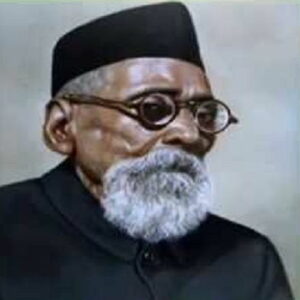Dhondo Keshav Karve was a prominent Indian social reformer and educator who advocated for women’s education and Hindu widow remarriage. He was known as ‘Maharshi,’ which means ‘great sage.’ He recognized the major flaw affecting orthodox Hindu society, namely the marginalization of Indian women, long ahead of his time. As a result, he founded the Widow Marriage Association in 1893 to aid their uplift, and he set a good example for others by marrying a widow himself after the death of his first wife. He also founded the Hindu Widows Home in Pune, which aims to help widows become self-sufficient if they are unable to remarry. Women’s literacy was one of his main priorities, therefore he founded the Shreemati Nathibai Damodar Thackersey Women’s Institution, India’s first women’s university. Later in life, he supported causes such as the development of local primary education associations and the abolition of the caste system and untouchability. On his 100th birthday, he received the Bharat Ratna, India’s highest civilian honor.
Childhood and Adolescence
Dhondo Keshav Karve was born in a lower-middle-class Brahmin family in Sheravali, Maharashtra, on April 18, 1858. Keshav Bapunna Karve was his father’s name.
He earned a bachelor’s degree in mathematics from Elphinstone College in Mumbai (then known as Bombay).
Career of Dhondo Keshav Karve
Dhondo Keshav Karve taught mathematics at Fergusson College in Pune, Maharashtra, from 1891 to 1914. He was motivated to struggle for women’s empowerment by leaders such as Pandita Ramabai, Vishnushastri Chiplunkar, and Iswar Chandra Vidyasagar.
He formed the ‘Widhawa-Wiwahottejak Mandali’ in 1893, which encouraged widow remarriage while also caring for their orphaned children. The Widhawa-Wiwaha-Pratibandh-Niwarak Mandali was renamed Widhawa-Wiwaha-Pratibandh-Niwarak Mandali in 1895. (Society to Remove Obstacles to Marriages of Widows).
In 1896, he founded the Hindu Widows’ Home Association, a refuge, and school for widows in the isolated village of Hingane, Maharashtra, outside of Pune. He picked the remote location since he had been expelled from Pune’s strict Brahmin community for encouraging widow remarriage and education.
He struggled to maintain his social reformatory initiatives due to a lack of funding. He traveled from Hingane to Pune for many years, both to teach mathematics at Fergusson College and to earn tiny amounts of money. He was roundly chastised by the conformists.
He founded ‘Mahila Vidyalaya’ in 1907. (School for Women). He established the ‘Nishkam Karma Math’ (Social Service Society) in 1908 to train workers for the widows’ home and Mahila Vidyalaya.
In 1916, he founded India’s first university for women, inspired by the Women’s University in Tokyo, Japan. With only five students, the institution was founded in Pune.
He founded the Training College for Primary Institution Teachers and the Kanya Shala, a ladies’ school, between 1917 and 1918.
A philanthropic manufacturer named Vithaldas Thackersey gave 1.5 million Indian rupees to the women’s university in 1920. The institution was renamed ‘Shreemati Nathibai Damodar Thackersey (S.N.D.T.) Indian Women’s University’ as a mark of respect.
In March 1929, he traveled to Malvern, England, to attend the Primary Teachers’ Conference. At a conference of the East India Association in Caxton Hall, London, he talked about “Women’s Education in India.”
He embarked on a yearlong trip to Africa in December 1930, sharing knowledge about his work for women in India with people in places like Mombasa, Kenya, Uganda, Tanganyika, and Zanzibar.
The S.N.D.T. University founded its first institution in Mumbai in 1931 and later moved its headquarters there.
He founded the Maharashtra Village Elementary Education Society in 1936 with the goal of establishing primary schools in areas that lacked them. He also urged the adults in the village to read more.
He formed the ‘Samata Sangh’ in 1944. (Association for the Promotion of Human Equality). The Government of India acknowledged S.N.D.T. Institution as a full statutory university five years later, in 1949.
In traditional Hindu society, he also supported the eradication of the caste system and the practice of untouchability.
Major Projects of Dhondo Keshav Karve
In early twentieth-century India, Dhondo Keshav Karve championed the cause of women’s education and widow remarriage. He also battled against the Hindu society’s extensive caste system and practice of untouchability.
‘Atmawrutta’ (1928) in Marathi and ‘Looking Back’ (1936) in English were his autobiographies.
Achievements & Awards
The Government of India bestowed upon him the Padma Vibhushan, India’s second-highest civilian award, in 1955. The Government of India honored him with the Bharat Ratna, India’s highest civilian honor, in 1958.
The Indian government released stamps commemorating his birth centenary in 1958. The stamps depicted a living person for the first time in independent India.
Personal History and Legacy
Child marriages were common in Indian society in the early twentieth century. When Karve was fourteen years old, he was married off to Radhabai, an eight-year-old girl. His parents orchestrated the wedding.
In 1891, his wife died while giving birth to their first child. He was left with a small boy named Raghunath Karve, who, like his father, grew up to be a visionary social reformer. He was a math professor who pioneered sex education and birth control in India.
Dhondo Keshav Karve wedded a 23-year-old widow named Godubai, who had been widowed within three months of marriage at the age of eight, two years after his first wife died.
Shankar, Dinakar, and Bhaskar were his other sons. Shankar was a well-known doctor in Mombasa, Kenya’s former British colony. Dinkar was a chemistry professor who eventually became the principal of Fergusson College. Bhaskar had many main roles at Hingane’s ‘Stree Shikshan Samstha.’
Dhondo Keshav Karve died in Pune, India, on November 9, 1962, at the age of 104.
In his honor, Mumbai’s Queen’s Road has been renamed Maharshi Karve Road.
Estimated Net Worth
The estimated net worth of Dhondo Keshav Karve is unknown.


